Written on Jul 20, 2023 9:38:37 AM
How to Stay Safe & Avoid an ATV Accident in Florida
Topics: personal injury, atv accident
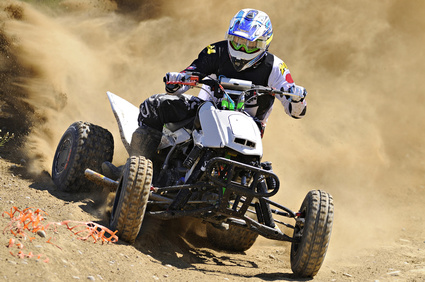
ATVs (a.k.a. all-terrain vehicles or quads) can be a ton of fun to ride. Racing through ATV trails is exhilarating as the engine roars and the trees, grass, and/or dirt rush by.
However, as fun as riding an ATV can be, it can also be extremely dangerous. Getting into an accident on an ATV can be extra deadly since these things don’t have seat belts, roll cages, or many of the safety features found in cars and trucks. If you have any ATV-related injuries, suddenly, it's not so fun anymore.
To help you avoid an accident while riding your ATV through some of the trails in Brooksville, Florida, and the surrounding areas, there are a few safety tips you can follow.
Florida Laws for Riding an All-Terrain Vehicle
ATV riders in Florida must adhere to the following safety regulations: all operators must be at least 16 years of age, wear an approved helmet while riding, and carry sufficient liability insurance. All passengers must be securely seated on the ATV. Additionally, a spark arrestor is mandatory in most parts of the state when using public lands or trails.
Florida also requires that all ATVs be registered through the Florida Department of Highway Safety and Motor Vehicles, regardless of whether they are used on public or private land. ATV riders must carry their registration information with them at all times when riding and display it upon request of a law enforcement officer. Non-resident operators must register their vehicles with the state before riding.
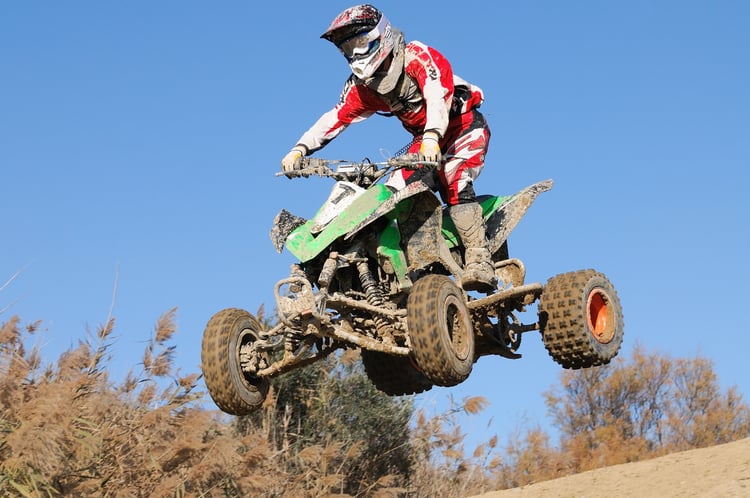
ATV riders in Florida must observe all posted signs and stay on designated trails to avoid trespassing. It is illegal to ride an ATV on public roads throughout the state, except for crossing them at intersections or when used for agricultural purposes. Additionally, most parks impose restrictions on where and when ATVs are allowed on their premises. Generally speaking, you can ride your ATV on an unpaved road during the day if the posted speed limit is 35 miles per hour or less.
By following these safety laws and regulations, ATV riders in Florida can ensure that they are riding safely and responsibly. Failing to abide by Florida law may result in fines or other penalties, so it is important for operators to be aware of the state’s regulations.
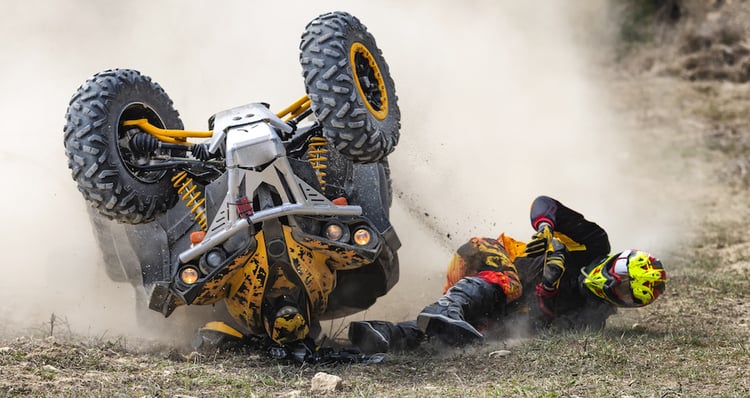
Florida ATV Accident Statistics
Despite the laws and regulations in place to protect ATV riders, accidents still occur. These can result in severe injuries, like spinal cord injuries or traumatic brain injuries, as well as bone fractures. ATV deaths are uncommon, but also not unheard of.
According to the latest data from the Florida Department of Highway Safety and Motor Vehicles, 30 ATV-related deaths were reported in 2020. Additionally, there were 446 reported injuries related to ATV use that year. There were 198 other crashes with no injuries reported in 2020.
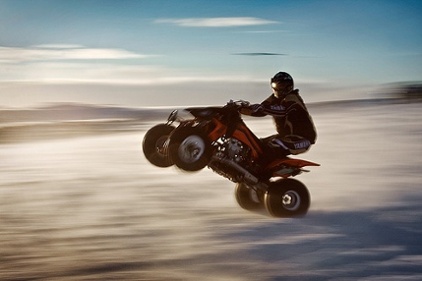
10 Safety Tips for Preventing ATV Accidents in Florida
Wear Protective Gear
You've most certainly heard this advice before. If you're going to ride an ATV, wearing a helmet is the easiest way of preventing head injuries. Be sure that your helmet has a sticker showing that it meets current safety standards. Never purchase a used helmet, as it may have already taken a blow from a prior ATV accident.
It's important to wear protective clothing specifically designed for ATV riders. It's also advised that underneath this clothing, you wear another layer of protection. Shorts are never recommended, and even a thin pair of jeans does little to shield you from flying debris. Many riders opt for pads, and this comes highly recommended by us, as well.
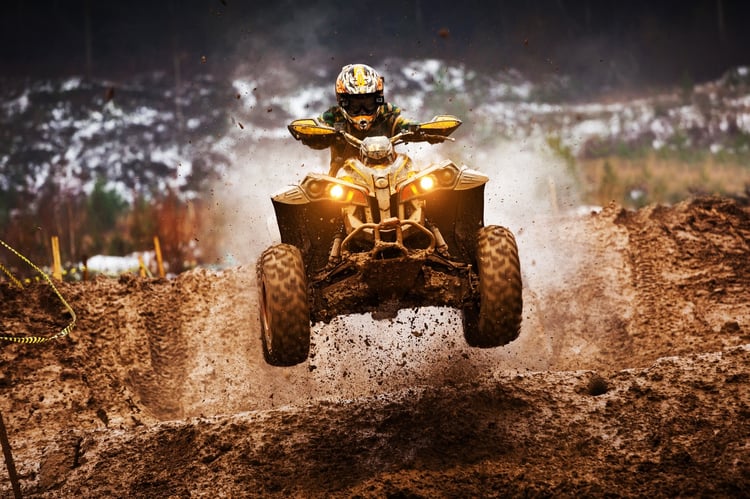
Safety gear includes but is not limited to:
- Helmets. Head protection is a must for ATV riding. Riding helms should cover your entire head and include a visor to protect your eyes from flying debris.
- Gloves. Thick padded gloves reduce the risk of injury to your hands and wrists.
- Boots. Strong, impact-resistant footwear helps keep your feet safe during a spill and prevents lacerations from contact with foliage.
- Jackets. While not required, it is a good idea to wear a tough jacket to protect your upper body from impacts. Many high-quality ATV safety jackets include reinforced plates for the chest, back, and shoulders.
- Pants. Once again, while not strictly required, you should wear thick protective coverings for your legs. Blue jeans are good, but reinforced sportswear with protective padding for your shins and knees is better.
Most safety regulations mandate the use of helmets with goggles, gloves, and boots as the minimum required for ATV riding. Wearing protective gear can be the difference between life or death when it comes to ATV accidents and preventing serious injuries.
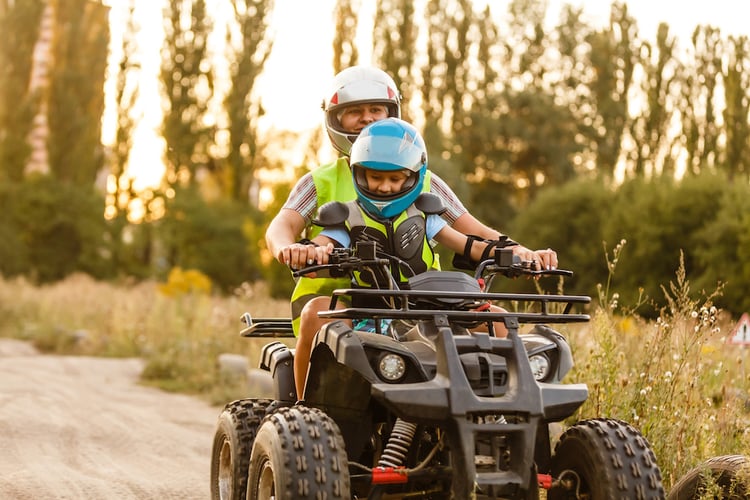
Make Yourself Visible
It may seem like a given, but the number one way for others to see you is for you to keep your headlight on. Make a conscious effort to do this. Also, wearing bright clothing actually makes yourself more visible to other riders, especially at night. Attire specifically designed for ATV riders is usually bright anyway, so this is actually optimal clothing. If you want to further increase safety measures, you can also opt for a reflective vest.
Maintain Eye Contact
Always try to be proactive in making eye contact with other ATVers or those who might be standing around where you are riding. Another rider could easily pull out in front of you, and cause a serious accident. It's vital never to simply assume that these other riders see you.
Know Your Surroundings
Dangerous terrain can be hard to spot, so make sure to know your surroundings and scout any trails if you can. Wet and icy grounds can severely reduce your traction, and can certainly cause you to wipe out. Make sure you consistently scan the terrain many yards in front of you.
Don’t Ride Alone
Bringing friends to go ATV riding with you is a great idea. Having extra people along helps ensure that if something does happen, there will be someone to call emergency services and provide aid. Also, they can help call out if you’re riding too dangerously.
However, bringing friends doesn’t mean having them share a spot on your ATV. Unless your ATV is designed for two, you should never have a passenger on your vehicle. A second rider not only puts extra strain on the ATV’s suspension, it makes it more difficult to balance during turns.
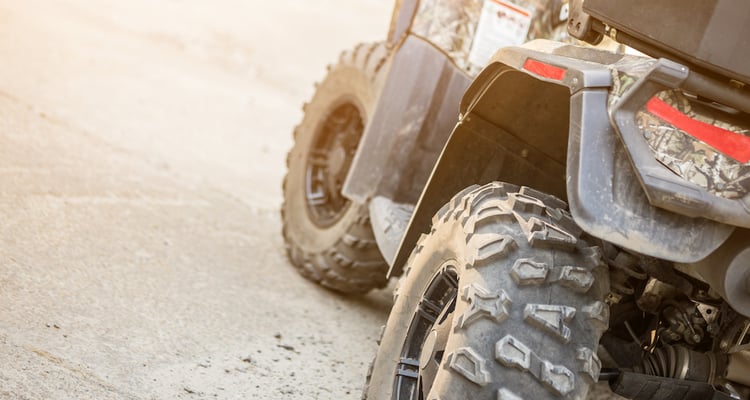
Keep Up With Routine Maintenance
Don't wait until you've suffered an ATV accident to take your vehicle in to be fixed. Taking your ATV in for a regular checkup will better your chances for a safe riding experience. When at the mechanic, don't be shy in asking them about any funny sounds or actions your vehicle might be making. Don't give off the impression that you know what you're talking about, and then have to deal with the consequences later, when you're the victim of a serious accident.
Check Your ATV Before & After Each Ride
ATVs tend to have a lot of exposed components and are subject to some hefty abuse during a ride. It’s all too easy for a critical cable, wire, or sprocket to get damaged or disconnected by an impact without you noticing the problem right away.
Damage to ATV components could impair your control over the vehicle, leading to an accident.
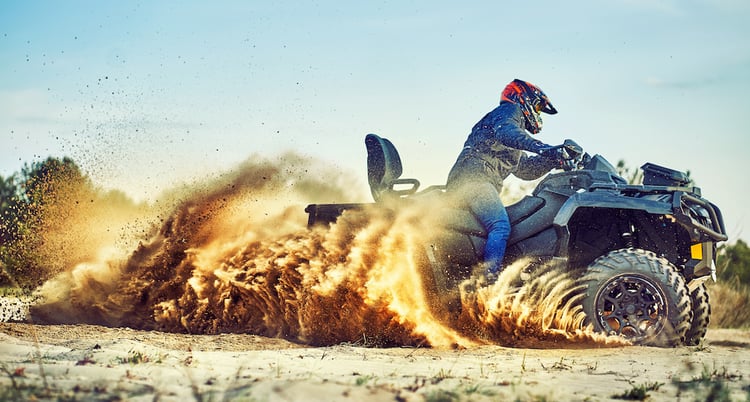
So, before taking your ATV out for a ride, take some time to carefully check the following:
- Tires. Are the tires worn out? Is there uneven wear in the treads? Are any foreign bodies embedded in the rubber?
- Chains. Are links worn out or out of place? Have the chains been properly lubricated?
- Controls. Are the connections and cables intact and connected properly? Are any gauges or indicators cracked?
- Sprockets/Gears. Are there broken teeth? Is there excessive grit or mud on the gears?
- Headlights. Make sure the headlights are functioning. While you shouldn’t ride in the dark, headlights can help make you more visible at all times.
Checking these components of your ATV prior to taking it out for a spin is critical to your safety.
Never Ride Under the Influence
You shouldn’t drink and drive on the road, and you definitely shouldn’t do it when you’re riding an ATV. Being intoxicated impairs your judgement, reaction time, and your senses—all of which can massively increase your risk of getting into an accident.
According to the American Academy of Pediatrics, “for patients over 15 who were tested, 35% were positive for alcohol and 25% for drugs.” That means that over half of all ATV accident victims were driving while impaired.
Additionally, you shouldn’t ride an ATV while you’re tired. If you feel exhausted while riding, take a break as soon as possible.
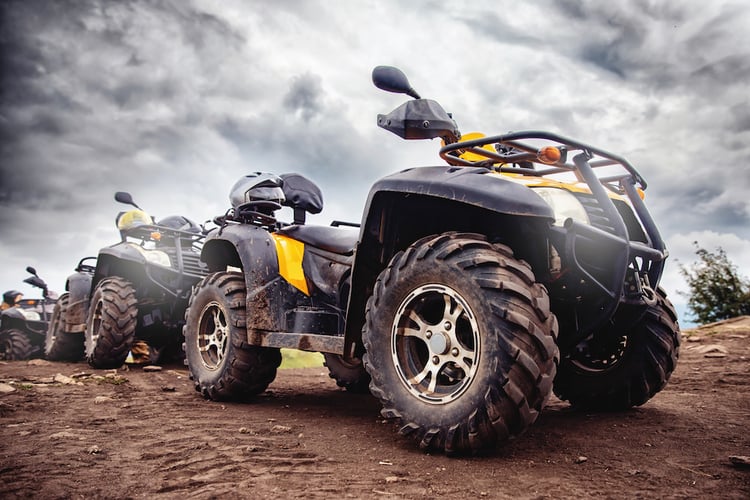
Use Designated Riding Trails
While trailblazing through unmarked woods sounds exciting, your safest option is to stick to a designated riding trail.
Not only does this help you avoid getting lost, riding trails have been specifically cleared of many dangerous obstacles that could cause you to get bucked from your ride. Also, riding trails have better visibility than wooded areas, helping to further increase safety for yourself and other riders.
Roads designed for regular motor vehicles, especially highways, should be avoided altogether while on an ATV.
Don’t Be a Showoff
When you’re racing down the trail and the adrenaline’s pumping through your veins, it can be really tempting to start showing off your riding skills by doing stunts (a.k.a. goon riding).
However, trying to do tricks and stunts is something that’s best left to professionals driving in a controlled setting.
Things such as going too fast, popping wheelies, taking your hands off the controls, and shifting your balance too much can all cause you to lose control of the vehicle and get into a wreck.
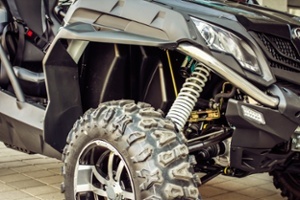
What to Do If You’re Involved in an ATV Accident in Florida
Were you or a loved one injured in an ATV crash in Brooksville, FL? If another rider is to blame or you suspect you had a defective vehicle, you may be entitled to compensation. Our team of personal injury attorneys is here to help. Our team has extensive experience working with injured clients on personal injury cases after ATV accidents. Contact us today for a free consultation.

